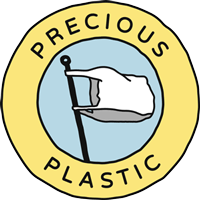
This article is part of Precious Plastic, a One Army project tackling the plastic waste problem. You can learn more
here.
Plastic has a lot of big problems, but there is a tiny problem invading our daily lives: Microplastics. These small little f***ers are polluting our oceans, entering food chains and causing environmental wreckage on a global scale.

So what are these microplastics?
Basically, microplastics are pieces of plastic smaller than a grain of rice (less than 5mm in diameter). Shredded plastic technically does not qualify as such (has to be even finer). But how do they become so small? There are a number of ways in which microplastics are created:
1. After some time in the environment larger pieces of plastic break up due to, amongst others, UV degradation.
2. They can be intentionally produced and become an integral part of shampoos and bathroom products (microbeads).
3. Lastly, synthetic fabrics can also release small particles of plastic when washed in normal washing machines (microfibers).

Microplastics are a real problem simply because they are so small. Water treatment plants cannot filter them out, so they enter the waterways. They blend in to sand and soil and are mistakenly consumed by plants, fishes and animals. And guess who (often) eats those animals and fishes? Exactly. Humans. Meaning most humans are consuming plastic.
Microplastics have already been found in birds, fish, and other animals… but now it hits home: scientists have now found microplastics in beer, drinking water, and 95% of all table salt! Not only that, but it has finally been found in the stool 💩 of humans. Okay, now I’m scared 😱
Any advice?
Everyone is potentially at risk, but especially us recyclers😅. As you might know, we work with plastics a lot. We study it, experiment with it, and test the boundaries of this precious material. We know the health hazards: the dangers of the machines we use, the fumes and gas from melting plastic, and of course the potential risks of microplastics. We try to stay safe. Although we currently use simple white dust masks for protection, we listen to advice from the public on our online forums for better safety practices.

Testing and experimenting
At our headquarter in The Netherlands we’re also researching ways to limit the damages caused by microplastics. Louis, our german boy, is working on a new cleaning system for plastic. In the process of his research, he creates lots of microplastic. To prevent the microplastics from entering the water streams he’s now studying and experimenting with multiple filtering systems to intercept the microevil before is too late. Louis says that Hopefully we’ll be able to share our findings soon with the rest of the community.

Until a global solution is found to tackle this problem, you might want to reduce the amount of plastic you buy or accept in your life. Plastic food packaging and synthetic clothing are common consumption habits that easily release microplastics, so just say no! This is the most immediate and effective way of showing people, businesses, and governments that you are not keen on contributing to the microplastic problem. Enough is enough. Start the revolution with your habits.
…Oh, did I mention there is a thing called Nanoplastics?





.svg)

